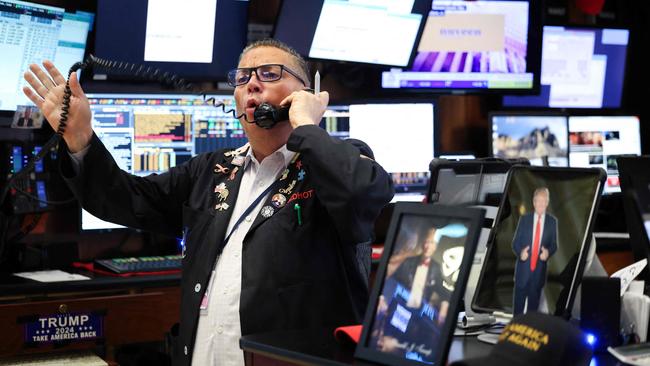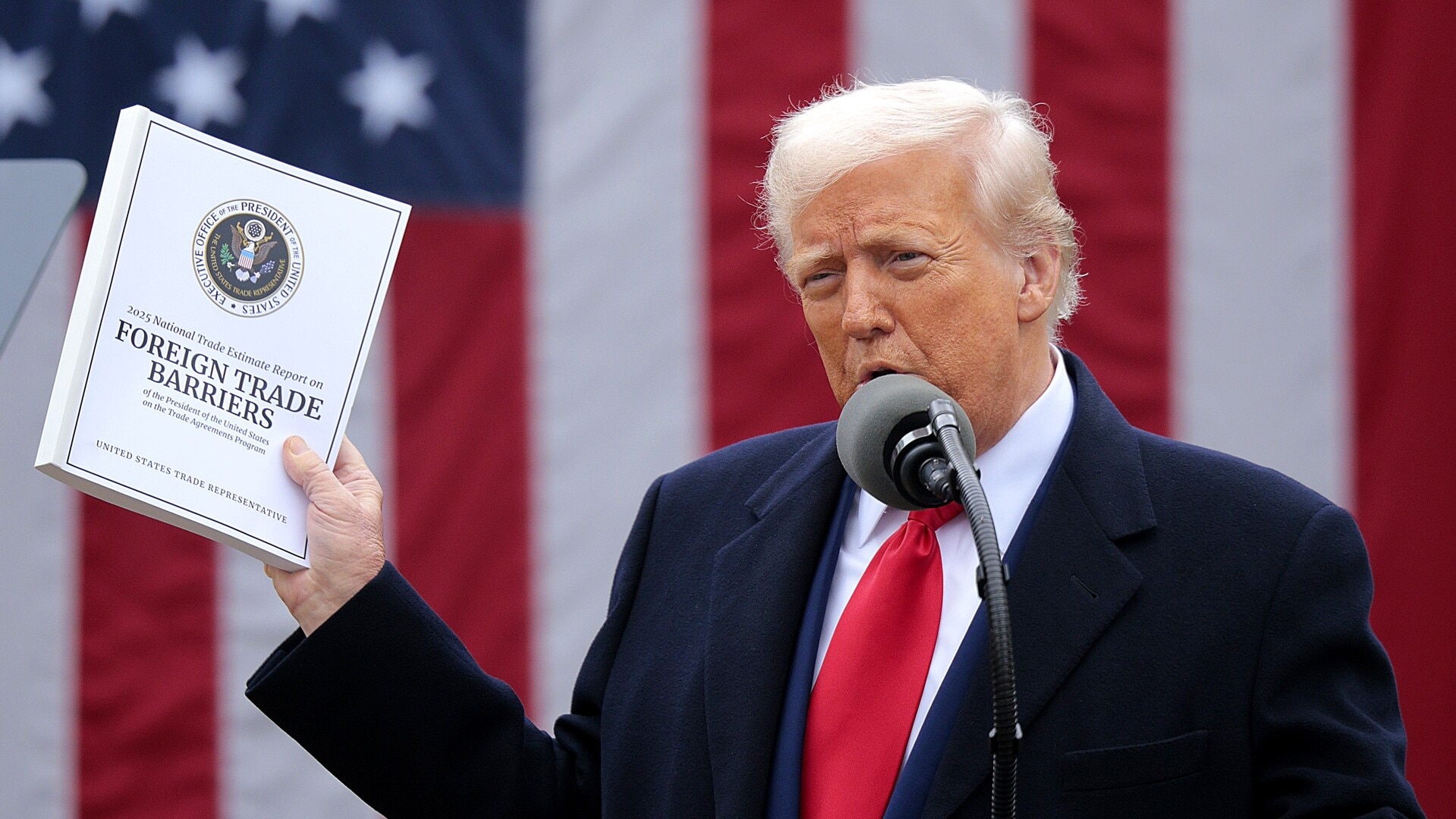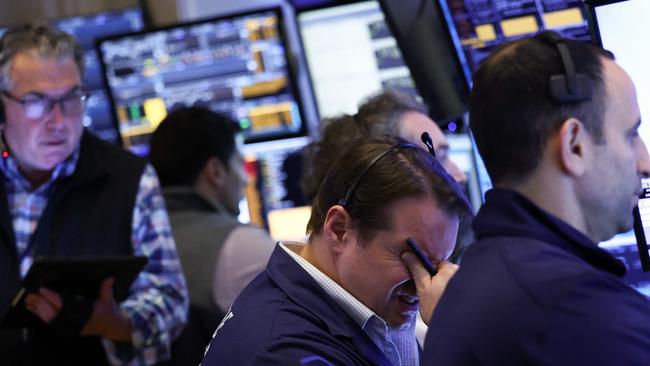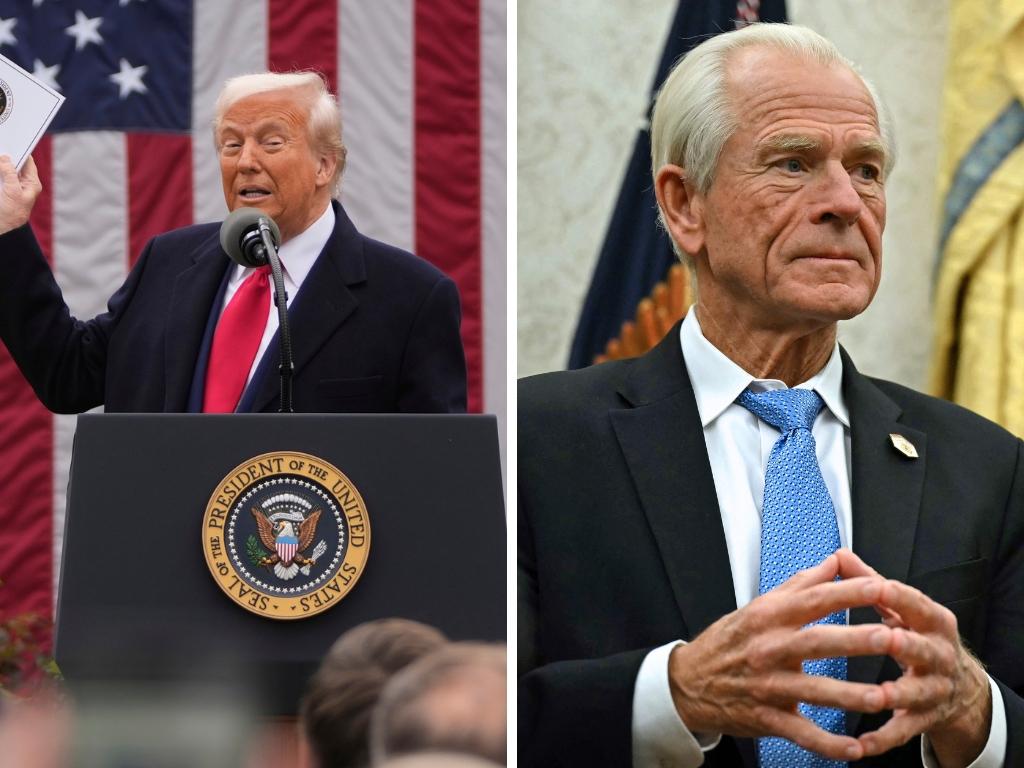Trump’s tariffs hit: Wall St dives 6pc as investors brace for recession
A global recession is almost inevitable after China waded into Donald Trump’s trade war with retaliatory tariffs of its own.

Business
Don't miss out on the headlines from Business. Followed categories will be added to My News.
An escalation in the tariff war as China retaliated against the United States unleashed carnage on Wall Street and pushed the Nasdaq into a bear market.
China slapped a 34 per cent levy on all goods imported from the US.
The S&P 500 swiftly dropped 6 per cent, the tech-heavy Nasdaq slid 5.8 per cent and the Dow Jones Industrial Average fell by 5.5 per cent.
The marketwide toll from the two-day tariff rout surged to a record $US6.6 trillion ($10.8 trillion) as investors brace for the US economy to sink into recession following the Trump administration’s economic conflict. A Nasdaq bear market means the world’s technology megacaps have fallen 20 per cent from their record high.
The Australian dollar tumbled nearly US3c in 24 hours to US60.40c, as markets sweat on the potential fallout for Australia’s economy, given its close trade ties with China.
Locally, the ASX’s energy giants were at the centre of the global economic slowdown as Brent crude slumped 10 per cent across two days to $US66.02 a barrel.
Just shy of $57bn was wiped from the S&P/ASX 200 in Friday’s session, sparked by a rush to safety. The sharemarket finished 2.4 per cent lower at 7667.8 points and is now down more than 10 per cent from its February peak, defining a market correction. Nearly all sectors finished in the red and energy stocks were the worst hit. Woodside and Santos tumbled more than 9 per cent apiece.
The decline on the ASX followed the US president launching a fresh offensive against trading partners, announcing worse-than-expected tariff hikes including a combined 54 per cent tax on China and a 20 per cent hit on EU goods. But that was not the end of it.
The tariffs, due to take effect from Saturday, have raised the chance of a US downturn in the coming months, investors said, while boosting the case for interest rate cuts.
“A recession in the middle to the back end of this year is certainly becoming more base case, if everything that was announced in Liberation Day sticks,” Ophir Asset Management co-founder Andrew Mitchell told The Australian.
“This is rolling back about a little over 100 years worth of trade liberalisation, and the knock-on economic impact is going to be very significant.”
Even if the tariffs bring nations to the negotiating table, that could take months, delaying any potential reprieve, he warned.
“While that’s all happening, just the uncertainty with businesses pulling back from capex and hiring, and consumers basically sitting on their wallets for a period, that could itself drive spending down to a level close to a recession in any case,” Mr Mitchell said.
Wall Street banking giant JPMorgan put the chance of a US and global recession at 60 per cent following the Trump administration’s scheme.
“Disruptive US policies have been recognised as the biggest risk to the global outlook all year,” chief economist and head of global economic research Bruce Kasman said.
“The latest news reinforces our fears as US trade policy has turned decisively less business-friendly than we had anticipated,” he cautioned.
The direct impact on households and business would be the biggest tax increase since 1968, according to Mr Kasman.
“The effect of this tax hike is likely to be magnified through retaliation, a slide in US business sentiment, and supply-chain disruptions.
“We view the full implementation of announced policies as a substantial macroeconomic shock not currently incorporated in our forecasts … these policies, if sustained, would likely push the US and possibly global economy into recession this year,” he said.
As economies around the globe weigh recession risks, investors are betting central banks, including the Reserve Bank, will need to cut rates harder and faster.

Already, ANZ Bank is tipping the RBA may cut by 50 basis points when it next meets in May, though this is not its base case.
ANZ now expects the RBA will cut in May, July and August, bringing the official cash rate to 3.35 per cent, down from the current 4.1 per cent. All four of the banking majors are now forecasting three further cuts to the cash rate by the end of the year.
The biggest losers on the Australian sharemarket on Friday were those that will be hit by the Trump tariffs. Auto parts supplier Amotiv plunged 17 per cent, while buy-now, pay-later player Zip fell 14 per cent and kitchenware favourite Breville tumbled 12 per cent.
Tourism Holdings shares slumped close to 8 per cent to $1.46 after the RV rental and manufacturing company revealed the tariffs would be another blow to the company’s North American business, which had already suffered a slow down in recent weeks.
“At this stage, there is uncertainty regarding the extent to which various tariffs imposed by the United States may impact the North American RV industry, including any potential retaliatory tariffs imposed by Canada that could impact RVs imported from manufacturers in the US,” Tourism Holdings chair Cathy Quinn said in a statement.
She said the company was monitoring the situation and that the tourism industry had already seen a decline in consumer sentiment for inbound travel to the US in recent weeks.
Elsewhere, surgical gloves and gowns maker Ansell jumped 3 per cent after it said it would “fully offset” US tariff increases through pricing and had already relayed this customers over the past 24 hours.
Markets are now trying to price in the certainty of a recession or, at the very least, a global economic slowdown, with investors turning fiercely toward defensives.
LGT Crestone head of public markets Todd Hoare said markets were behaving very similarly to 2018, when President Trump imposed tariffs in his first term. The latest tariff hits are much more widespread.
“Although there are differences around inflation, budget deficit and the Fed funds rate, the market is actually playing it exactly the same way. The US underperformed the rest of the world during Q4 of 2018 and growth underperformed value during that time. So the market is treating it the same (as in 2018) but the backdrop is very different.”
US sharemarkets had ended Thursday’s session at their lows, suggesting further downward pressure.
“Overnight in US trade we saw the biggest underperformance of cyclical sectors versus defensives in about 15 to 20 years. It was enormous. So the market is very much (taking a) recessionary view,” Ophir’s Mr Mitchell warned.
Among the hardest hit were Nike, down 14 per cent, Apple, down 9 per cent and AI play Nvidia, down 7 per cent.
Nike rebounded 3 per cent in Friday’s Wall Street trade, as President Trump flagged potential talks with Vietnam.
If concessions aren’t made and countries instead retaliate with their own tariffs, sparking an all-out global trade war, investors see stability in consumer staples, healthcare and utilities.
Munro Partners chief investment officer Nick Griffin expects Vietnam, Cambodia and some other Asian countries to fall in line and accede to what the US wants in terms of tariffs, but warned of more tension with China, Europe and Japan.

“If they retaliate, then this is going to go on. And if you put yourself into Donald Trump’s shoes, he would say he’s gone low (with the base tariffs). That leaves the reciprocal tariffs up for negotiation,” Mr Griffin told The Australian.
The EU, China and Japan have yet to formally declare retaliatory tariffs or actions but have all vowed to take countermeasures.
Mr Griffin sees tariffs slowing global growth and having a deflationary impact in the long run and says Australia is hostage to what happens between the US and China.
Franklin Templeton Fixed Income chief investment officer Sonal Desai said the impact of tariffs on US growth and inflation would be manageable if the Trump administration follows through on promises of income tax cuts and deregulation.
Based on her “back of the envelope” numbers, the $US400bn to $US600bn President Trump expects the tariffs to raise in revenue are equivalent to a 2 to 3 per cent tax on total consumption of goods and services.
“It would also correspond to a 12 to 18 per cent average tariff on all imports of goods (as 2024 goods imports amounted to about $US3.3 trillion),” she says.
“Trump indicated that the focus will now shift toward tax and spending cuts. Incremental reductions in personal and corporate income taxes would mitigate the adverse impact of tariffs on growth. But there is a trade-off here: Larger income tax cuts would also offset some of the revenue impact of tariffs.
“While the next round of trade discussions plays out, it’s time for the administration — and for investors — to shift attention and focus to taxes and deregulation. Progress in these areas would be crucial to offset the damage from tariffs,” she said.
More Coverage
Originally published as Trump’s tariffs hit: Wall St dives 6pc as investors brace for recession





